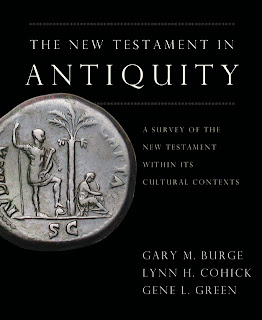
 Kevin J. Vanhoozer, Charles A. Anderson and Michael J. Sleasman
Kevin J. Vanhoozer, Charles A. Anderson and Michael J. SleasmanGrand Rapids: Baker Academic, 2007.
Everyday Theology teaches the skill of “reading culture” theologically. This means achieving Christian understanding of "what is going on in our part of the world, why it is going on, and how we should respond” (9). According to the editors every Christian should gain some competency in reading and interpreting culture through the lens of the Bible and Christian faith. The book is designed to both teach and illustrate how one “makes Christian sense” of everyday life. This is accomplished by a length introductory essay followed by a number of case studies in which the methodology introduced is illustrated. The concept of the book is well executed.
The book's central thesis is that Christ followers must learn to discern how our faith is shaped by the world we live in and how we are to embody our faith in forms of everyday life. The book then is intended to help achieve a cultural literacy, that is the ability to read and write culture, by providing the basic tools and a method. The book’s purpose is to equipped followers of Jesus to critically and constructively engage culture for the sake of the gospel. Everyday Theology is comprised of a foundational essay (ch 1) by Kevin Vanhoozer with another 10 essays as illustrative of the method Vanhoozer outlined. The book's genesis was a course at TEDS that Vanhoozer taught and the editors are former students.
Full disclosure: Charles is a dear friend of mine. We overlapped in Cambridge and both were students of Markus Bockmuehl. You'll find our names together in the list of students that attended the "Grandchester Meadows Group" in the preface to Markus' book
Seeing the Word
.
I think the concept that the book seeks to articulate and illustrate is important, fascinating and timely. There has always been a need for pastors to be able to exegete both the Bible and the culture. But the need has never been greater than it is today. Vanhoozer has provided a tool for those who want to be “cultural agents” in the world. I for one found the book’s central idea compelling and deeply motivating. It touches a deep passion for competency as a critical thinker. I would have to say that this is one of my chief life pursuits. I want to be a critical thinker in every area of my life and not least culture. Quoting Silverman and Rader, Vanhoozer states, “You can be in the world more fully if you are a critical, thoughtful, insightful reader of the world around you” (55).
The book’s first essay written by Vanhoozer (55 pgs long) is a crash course in cultural hermeneutics. In addition to outlining a hermeneutical method, the chapter provides a context for the approach by providing an overview of background information such as definition, history of research and theological and biblical warrants. I think this is a must read for pastors, although it is "thick" and will take patience to muddle through. You won't be disappointed for the work though.
Here’s my one criticism of an otherwise excellent book. The expectations implicit in the method are unrealistic for the everyday pastor let alone Christian. This is slightly problematic since the books major contention is that every Christian should be an everyday theologian. How will the average Christian—and that is to say nothing of the average biblical scholar or theologian (of which I consider myself)—be able to competently employ the multiperspectival, multilevel, multidimensional approach Vanhoozer advocates. He argues that to adequately interpret culture we need to be “light on our feet”. By which he means “prepared to move between history, economics, psychology, sociology, film studies, architectural engineering, marketing, and of course theology” (45). While his point is no doubt true, the reality is that only the most gifted of persons can hope to be that light of foot and I certainly don’t count myself among that group.

One more thing. Three times over the next three months I'm leading an event with the college ministry, called
CRAVE, and Twenty's ministry at my church called Film + Theology, an idea I stole from Mark Driscoll's church Mars Hill. I'm going to attempt to employ Vanhoozer's Method in my studying of the films we'll be viewing. The book has a well-written chapter (ch 6) on film written by Michael Sleasman.
 The New Testament in Antiquity: A Survey of the New Testament within Its Cultural Context
The New Testament in Antiquity: A Survey of the New Testament within Its Cultural Context


